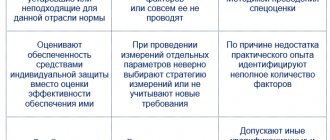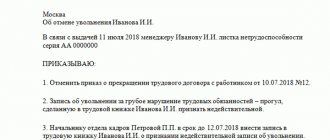Administrative liability of the employer in case of an accident at work
If the head or other responsible person of the organization refuses to comply with the requirement or order of an official of the regulatory body (for example, to submit documents on labor protection to the state labor inspector during the investigation of an accident), administrative punishment is provided in the form of a warning or a fine in the amount of 2,000 to 4,000 rubles . (Part 1 of Article 19.4 of the Code of Administrative Offenses of the Russian Federation).
For other actions that impede the inspection (for example, if a state inspector is not allowed into an organization), the head of the organization can be fined from 2,000 to 4,000 rubles, and the legal entity itself - from 5,000 to 10,000 rubles. (Part 1 of Article 19.4.1 of the Code of Administrative Offenses of the Russian Federation).
If, as a result of obstacles on the part of the organization, the inspection was never carried out, the fine will be (Part 2 of Article 19.4.1, note to Article 2.4 of the Code of Administrative Offenses of the Russian Federation):
- from 5,000 to 10,000 rubles. — for the head and other responsible persons of the organization;
- from 20,000 to 50,000 rub. - for the organization.
If the manager (other responsible person) held accountable within the period specified in Art. 4.6 of the Code of Administrative Offenses of the Russian Federation, if he repeatedly interferes with the inspection, he may be disqualified for a period of six months to one year or fined in the amount of 10,000 to 20,000 rubles. The organization, in case of repeated violation, faces a fine of 50,000 to 100,000 rubles. (Part 3 of Article 19.4.1 of the Code of Administrative Offenses of the Russian Federation).
If during the investigation of the accident it is proven that the employer violated labor protection legislation, he faces administrative liability in accordance with Art. 5.27.1 Code of Administrative Offenses of the Russian Federation.
For failure to comply within the prescribed period or improper fulfillment of a legal order of the state labor inspector to eliminate violations of labor legislation and other regulatory legal acts containing labor law norms, the employer may be held administratively liable in accordance with Part 23 of Art. 19.5 Code of Administrative Offenses of the Russian Federation.
If there were attempts to hide the occurrence of an insured event (caused by an accident), the organization may be fined in the amount of 5,000 to 10,000 rubles, and the head of the organization - from 500 to 1,000 rubles. (Article 15.34, note to Article 2.4 of the Code of Administrative Offenses of the Russian Federation).
Responsibility lies with the final contractor.
According to Art.
751 of the Civil Code of the Russian Federation, when carrying out construction and related work, the contractor is obliged to comply with the requirements of the law and other legal acts on environmental protection and the safety of construction work. The contractor is responsible for violation of these requirements. In addition, he does not have the right to use materials and equipment provided by the customer during the work, or to follow his instructions, if this may lead to a violation of the requirements for environmental protection and safety of construction work that are mandatory for the parties. If the law or the contract does not require the contractor to perform the work provided for in the contract personally, he has the right to involve other persons (subcontractors) in fulfilling his obligations. In this case, the contractor acts as a general contractor (Article 706 of the Civil Code of the Russian Federation).
In this case, the general contractor engaged a subcontractor who has SRO approval to perform the specified type of work to perform the work. The contract with him must contain a condition that the subcontractor, when performing work, comply with the requirements of the law and other legal acts, including safety regulations. The submission by the subcontractor of an order to the engineering and technical workers responsible for occupational health and safety also confirms its acceptance of responsibility
, provided for in the Code of Practice “Occupational Safety in Construction. Industry standard instructions on labor protection”, approved by Resolution of the State Construction Committee of Russia dated 01/08/2003 No. 2.
According to Art. 1084 of the Civil Code of the Russian Federation, harm caused to the life or health of a citizen during the performance of contractual obligations is compensated according to the rules of Ch. 59 of the Civil Code of the Russian Federation, unless a higher amount of liability is provided for by law or agreement. Article 1064 of the Civil Code of the Russian Federation provides that harm caused to the person of a citizen is subject to compensation in full by the person who caused the harm.
However, the obligation to compensate for harm may be imposed on a person who is not the causer. So, in accordance with Art. 1079 of the Civil Code of the Russian Federation Legal entities and citizens whose activities are associated with an increased danger to others, including those carrying out construction and related activities, are obliged to compensate for damage caused by a source of increased danger, unless they prove that the damage arose as a result of force majeure or the intent of the victim. The obligation to compensate for damage is assigned to a legal entity or citizen who owns a source of increased danger by right of ownership, economic management or operational management or on another legal basis (by lease, by power of attorney for the right to drive a vehicle, by virtue of an order from the relevant authority to transfer it to source of increased danger, etc.). Moreover, if there are several owners of sources of increased danger, they are jointly and severally liable for damage caused as a result of the interaction of these sources.
As an example, let us cite the Determination of the Moscow City Court dated June 22, 2011 No. 33-18896. The court imposed liability for personal injury resulting in death as a result of an accident, not on the company that owned the car, but on the company that rented the car, whose employee was the culprit of the accident.
In the case under consideration, the construction activity itself is associated with an increased danger to others. In fact, the construction and installation work during which the accident occurred was carried out by a subcontractor company. Accordingly, responsibility for the accident lies with her.
.
Criminal liability of the employer in case of an accident at work
If the accident was severe or resulted in the death of an employee, the perpetrator will be held criminally liable.
For causing serious harm to the health of an employee, punishment is provided in the form (Part 1 of Article 143 of the Criminal Code of the Russian Federation):
- fine up to 400,000 rubles. or in the amount of wages (or other income) of the convicted person for a period of up to eighteen months;
- compulsory work for a period of 180 to 240 hours;
- correctional labor for up to two years;
- forced labor for up to one year;
- imprisonment for up to one year. Additionally, the perpetrator may be deprived of the right to hold certain positions or engage in certain types of activities for up to one year.
If the accident led to the death of an employee, the perpetrator will be punished as follows (Part 2 of Article 143 of the Criminal Code of the Russian Federation):
- imprisonment for a term of up to four years. Additionally, the perpetrator may be deprived of the right to hold certain positions or engage in certain types of activities for up to three years.
If an accident led to the death of several workers, the culprit may (Part 3 of Article 143 of the Criminal Code of the Russian Federation):
- be sent to forced labor for up to five years;
- imprisoned for a term of up to five years. Additionally, the perpetrator may be deprived of the right to hold certain positions or engage in certain types of activities for up to three years.
For example, the head of an organization, his deputy, or the head of a structural department may be held accountable under Art. 143 of the Criminal Code of the Russian Federation in the event that they knew about the violations, but did not take the necessary measures to eliminate them, gave instructions that contradict regulatory labor protection requirements, or did not ensure their compliance.
The court, based on the results of an investigation into the circumstances of the accident, the nature of the violations committed, the severity of the consequences, studying the job responsibilities of each responsible person and other factors, decides the question of who should bear criminal liability for an industrial accident in each specific situation (clause 8 of the Plenum Resolution Supreme Court of the Russian Federation dated April 23, 1991 No. 1).
It's my own fault
Generalization of cases of one category by the Supreme Court of the Russian Federation is often done solely for the “uniformity of application of criminal legislation by courts.” That is, so that in different courts of the country, judges considering cases, say, about an accident at a construction site, do not make radically different verdicts.
It is clear that the Supreme Court of the Russian Federation holds such plenums, of course, primarily for its colleagues - local judges who have to consider such cases. But it would be wrong to call the resolutions of the Plenums exclusively “documents for internal use.” The Plenum's explanations may also be useful for ordinary citizens. Moreover, at Plenums we always talk about the most important categories of cases considered by our courts.
The resolution of the Plenum of the Supreme Court, which is discussed today, explains
in which cases the employer is not responsible for the injury or death of an employee.
Unhappiness at work is, unfortunately, not a rare phenomenon these days. After an emergency, especially if it resulted in serious consequences, there are dead or injured, as a rule, a criminal case is initiated. The wording in such cases is also standard - violation of safety regulations. Law enforcement officers, and these are investigators of the Investigative Committee, are tasked with checking who is to blame for the fact that the scaffolding collapsed, the tunnel walls failed, or something similar happened due to the fault of the foreman, or the worker neglected the requirements of the instructions.
RG experts explain the legal aspects of labor relations in the “Legal Consultation” section
The main thing in the Resolution of the Plenum of the Supreme Court is this. The document states that, under a criminal article, the head of an enterprise will not be held accountable to the law only if his employee himself violated labor protection requirements.
“If it is established that an industrial accident occurred only as a result of the negligent behavior of the victim himself, the court must, if there are grounds for this, decide on the issue of issuing an acquittal.”
There is also an important clarification in the document. It concerns workers who seem to be working in production, but they do not have a full-fledged employment contract in their hands. By using illegal or semi-legal labor, some employers hope that in case of trouble they will be able to disown - not my employee. The Supreme Court took this option into account.
The Resolution states: victims in such criminal cases can be not only employees with whom employment contracts have been concluded, but also citizens with whom no employment contract has been concluded. Or the citizen has an agreement in his hands, but it is executed “inappropriately.”
The plenum emphasized that the boss will definitely be held accountable under a criminal article if workers without a contract or with a suspicious contract, “without the necessary pieces of paper” nevertheless started work “with the knowledge or on behalf of the employer.”
It is worth paying attention to one more serious point in the document. It says that if two or more bosses violated labor safety requirements, then each of them will be held accountable. But this will happen if the violations of the rules committed by them “are in a causal connection with the consequences that have occurred.”
Separately, the Resolution draws attention to the responsibility of employees of the organization in which the accident occurred, if the emergency occurred during work with special self-propelled equipment - tractors, scrapers, graders, excavators.
Disciplinary liability of the employer in case of an accident at work
The head of the organization may be subject to disciplinary action, up to and including dismissal (Article 192 of the Labor Code of the Russian Federation), like any other employee.
Public control over compliance with the legal rights and interests of the insured in accordance with Federal Law No. 125-FZ of July 24, 1998 “On compulsory social insurance against industrial accidents and occupational diseases” is carried out by trade unions.
An accident at work is an insured event if it occurs with the insured or another person subject to compulsory social insurance against accidents at work and occupational diseases.
Federal Law of July 24, 1998 No. 125-FZ “On compulsory social insurance against industrial accidents and occupational diseases”
(Extract)
Article 26. Control over the implementation of compulsory social insurance against accidents at work and occupational diseases
- State control over the observance of the rights of insurance subjects and the fulfillment of their duties by them is carried out in the manner determined by the legislation of the Russian Federation. State control over the financial and economic activities of the insurer and the implementation of compulsory social insurance against industrial accidents and occupational diseases is carried out by the Accounts Chamber of the Russian Federation, and in terms of the use of appropriations from the federal budget - also by the federal executive body in the field of finance.
- At least once a year, the insurer ensures that its financial and economic activities are audited by a specialized audit organization that has the appropriate license.
- Public control over compliance with the legal rights and interests of the insured in accordance with this Federal Law is carried out by trade unions or other representative bodies authorized by the insured.
The issue “Employer's liability in case of an industrial accident” is revealed from the Practical Guide “Investigation of Industrial Accidents and the Role of the Representative Elected Body of the Primary Trade Union Organization” M:, 2018 prepared by the Central Committee of the Trade Union of Healthcare Workers of the Russian Federation.
The Guide also covers the following questions:
- Legislation and regulations applicable in the investigation of cases of injury at work and occupational diseases
- Signs of concealing an insured event
- Accidents subject to investigation and recording
- Accidents not related to production
- Procedure for notification of accidents and others
The full text of the Practical Guide can be found in the Practical Materials section.
Olga Sofronova
If the information was useful, leave a comment and share the link to this article on your social networks. Thank you!









